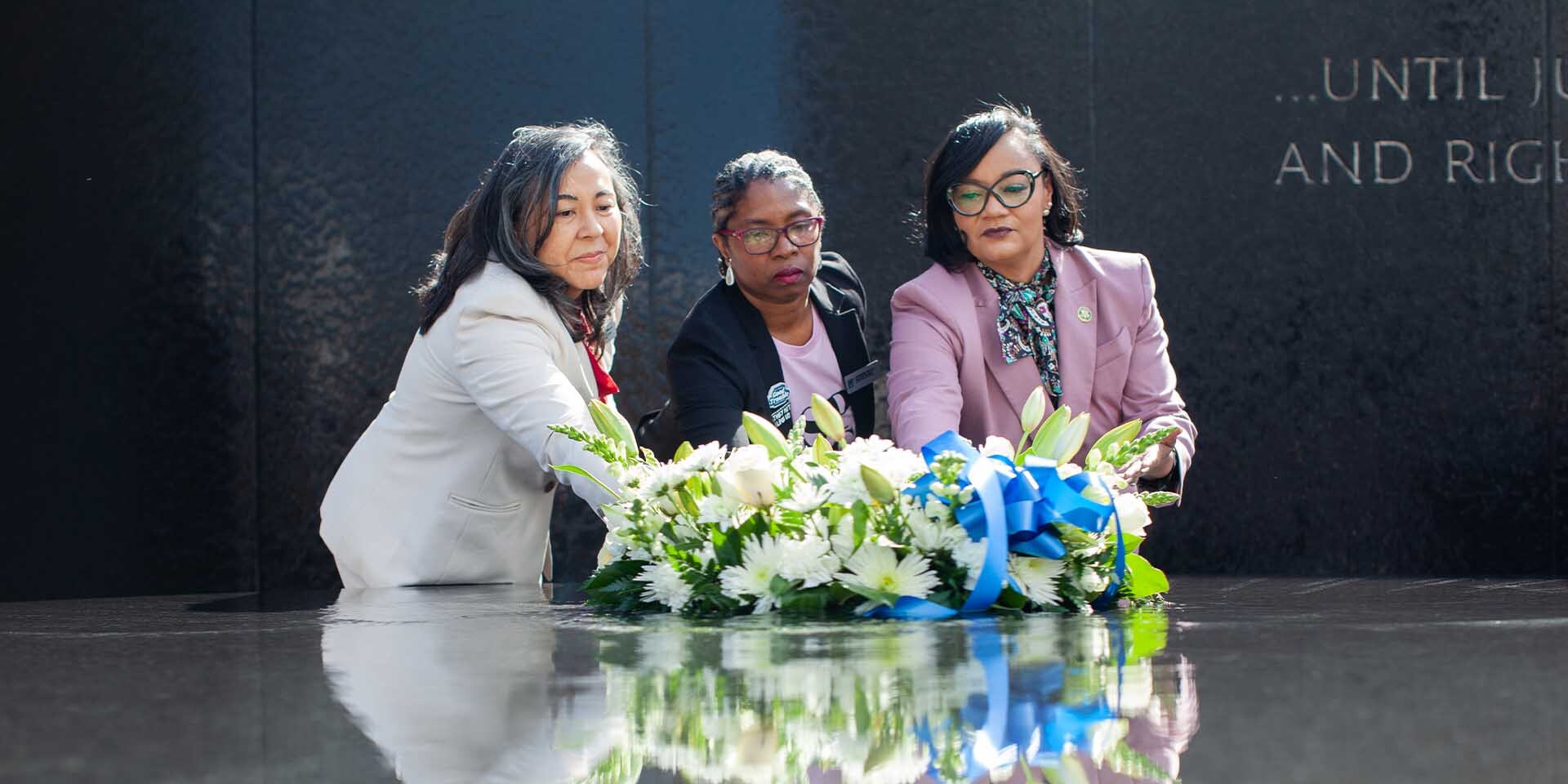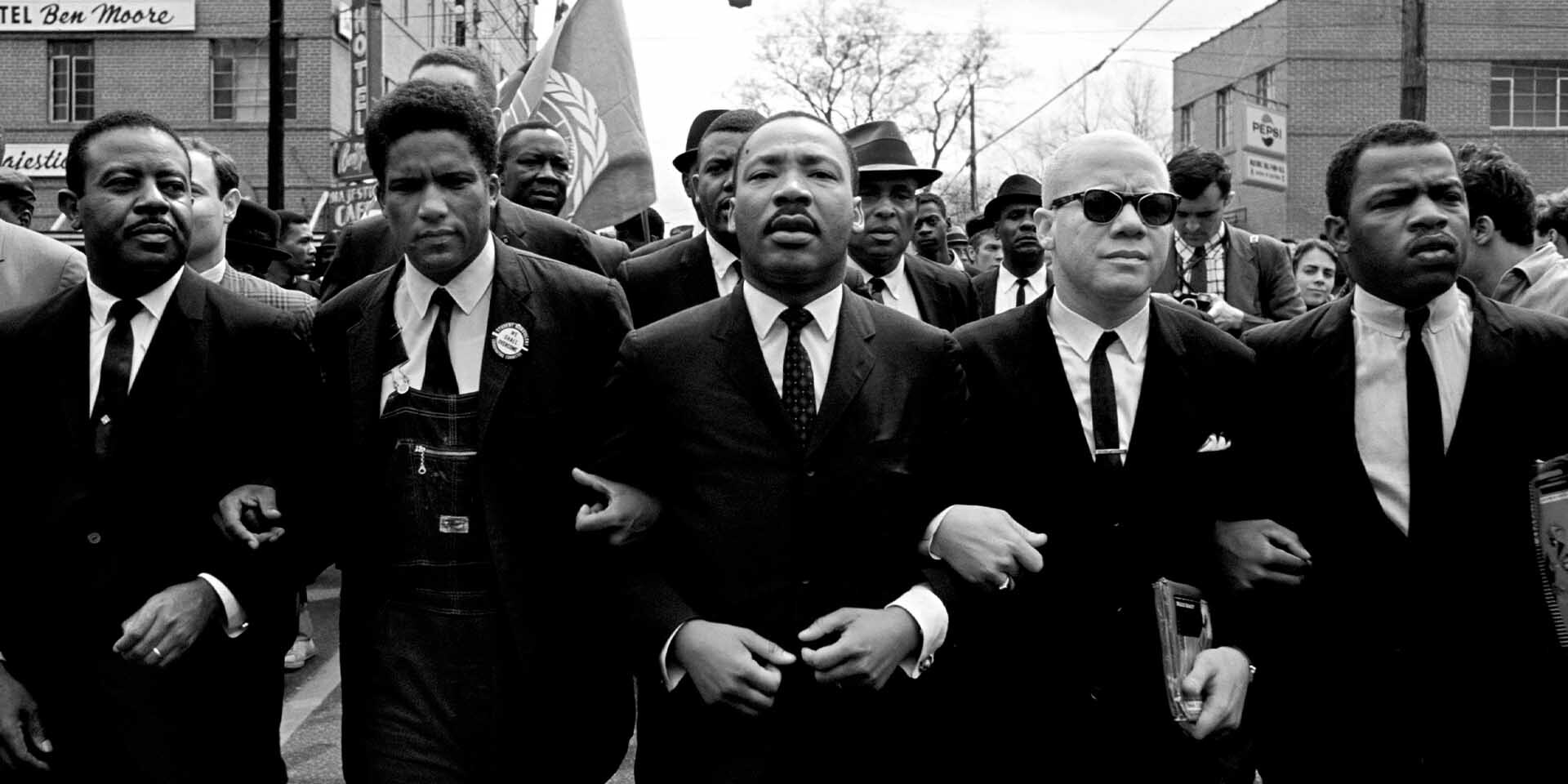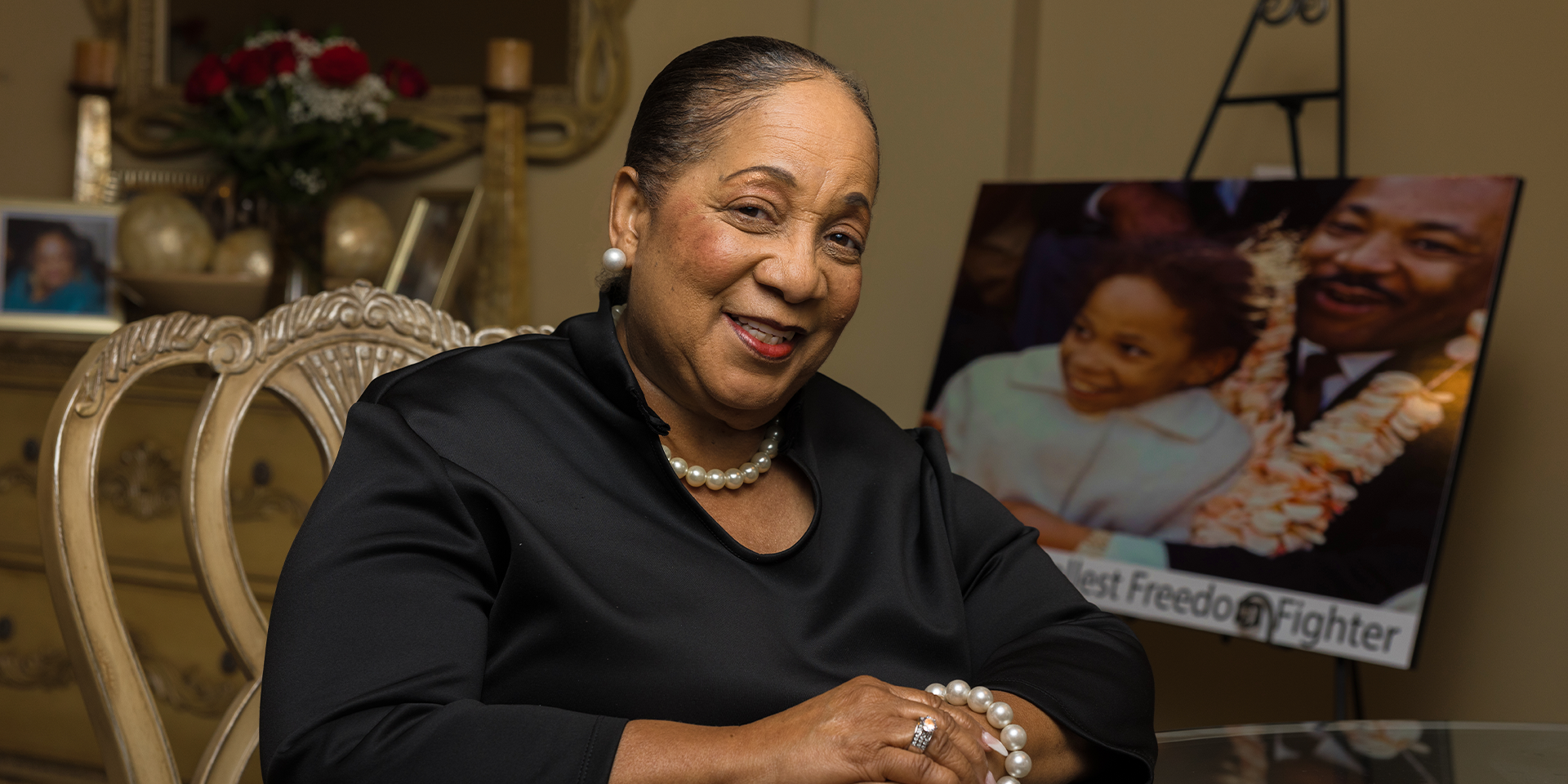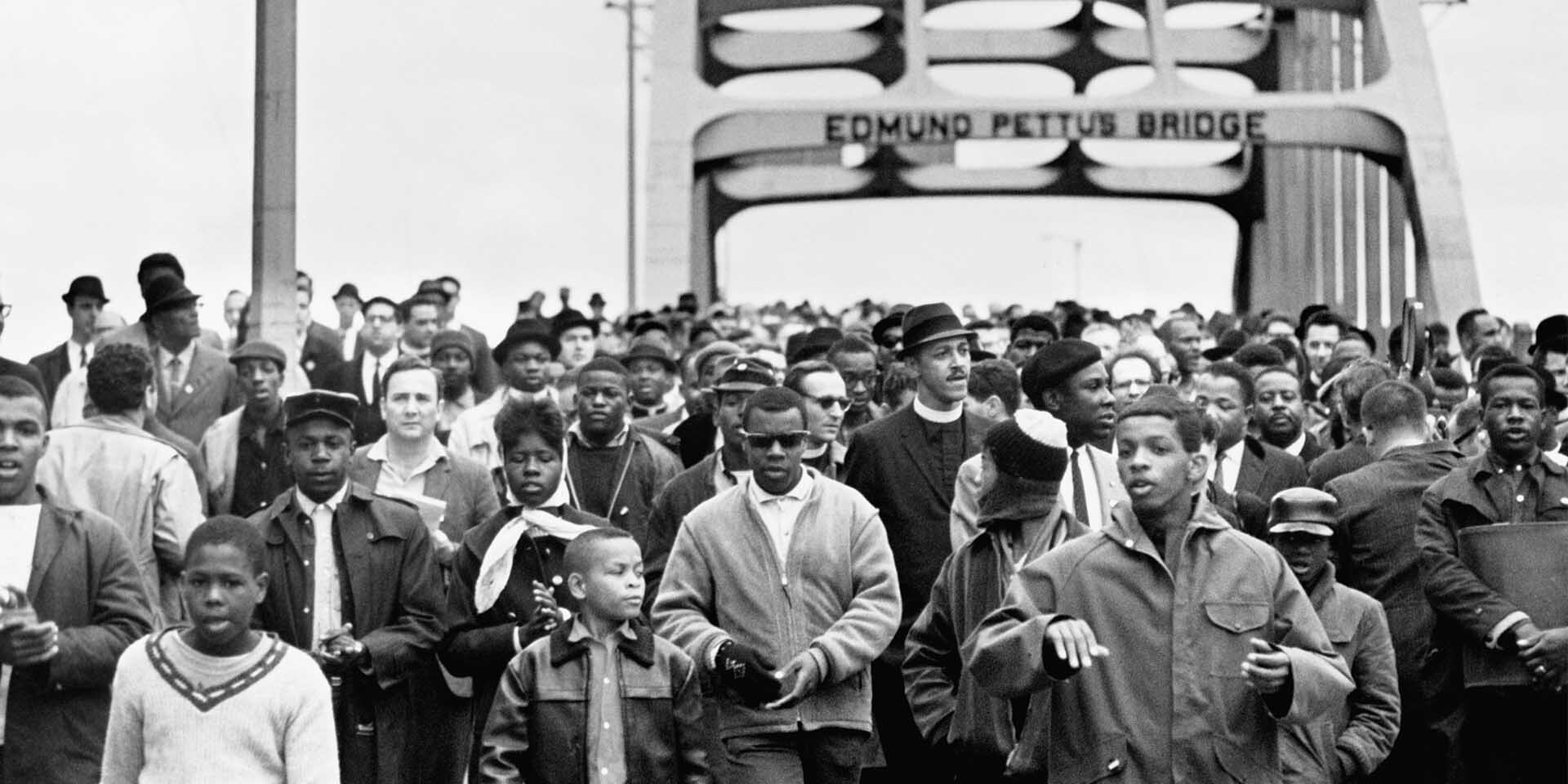Sixty years ago today, hundreds of ordinary Americans came together for one of the most historic protests in this nation’s history. They met in Selma, Alabama, on March 7, 1965, at the foot of the Edmund Pettus Bridge with an inflexible mission: to get the Voting Rights Act (VRA) passed and enshrine Black people’s right to vote.
These people — churchgoers, teachers and young teens — who would become known as civil rights “foot soldiers” stood together in the face of hatred and brutal attacks from their fellow citizens and state authorities.
Sixty years later, the VRA they marched, bled and died for is under attack.
This afternoon, Southern Poverty Law Center President and CEO Margaret Huang spoke to a crowd of advocates, supporters and congressional representatives who gathered at the SPLC’s Civil Rights Memorial in Montgomery, Alabama, to honor 40 civil rights martyrs whose names are inscribed on the Memorial’s circular granite table. The Memorial is installed in a public space just outside the Civil Rights Memorial Center (CRMC), across from the SPLC’s headquarters in Montgomery. The crowd also honored the late U.S. Rep. John Lewis, who co-led the Bloody Sunday march.
“Like those who marched before us, we find ourselves at a crossroads in this country,” said Huang. “Between those who want to suppress the vote, to discriminate against those who are different, and those who envision a multiracial democracy that protects the rights of every human being.”
Because of the violence they faced, it would take those first foot soldiers three attempts to cross the Alabama River, walking from Selma to Montgomery in protest of the unjust laws and actions of Southern authorities who denied Black people their democratic rights. The foot soldiers’ determined, collective, nonviolent movement would push the country forward, leading to the passage of the landmark legislation that protects every American’s right to vote today.
History made and making
The SPLC dedicated the Civil Rights Memorial site in 1989 to honor martyrs who died at the height of the Civil Rights Movement, between the 1954 U.S. Supreme Court school desegregation decision in Brown v. Board of Education and the assassination of Martin Luther King Jr. in 1968.
But while today’s ceremony lauded the memory of those past, the speakers focused on how attention needs to be focused on the fight happening now.
“Today, we must answer the question: What would you do if your rights were threatened?” said Huang. “Because they are. Our rights are at risk. And we should honor the civil rights martyrs by refusing to back down at this moment of fear and uncertainty.”
U.S. Rep. Nikema Williams vowed to carry on the legacy of late civil rights activist and congressman Lewis after Georgia voters elected her to his congressional seat following his death in 2020. Williams spoke to the crowd of more than 50 people assembled today, some seated in chairs that circled the black granite Memorial, others standing in rows behind them.
“The work doesn’t just happen in Congress. That is what Mr. Lewis taught us,” Williams said. “What we saw back then, 60 years ago, is that the power was with the people.”
Lewis fought tirelessly for the passage of the VRA, and endured attacks and police beatings as a freedom fighter working to desegregate public spaces and transportation in the South. For many years, he led an annual congressional pilgrimage, sponsored by the Faith & Politics Institute, to the Memorial and historic civil rights sites in Alabama.
On March 5, U.S. Rep. Terri Sewell reintroduced the John R. Lewis Voting Rights Advancement Act (HR 14). The bill, cosponsored by every House Democrat, would restore and update the protections of 1965’s VRA to counter voter suppression today.
“While we might not be counting jellybeans in a jar,” said Williams, referencing a Jim Crow-era tactic used to prevent Black people from voting, “we have seen enough of the voter suppression tactics across these Southern states and across the country that we need to make sure that voting is standardized so that everyone has free and fair access to the ballot — no matter your ZIP code.”
As the ceremony closed, local singer Jailyn Ausborn, accompanied by guitarist Roderick Brown and keyboardist Terrence Baldwin, sang a rendition of India.Arie’s “We Are.” Ausborn is the daughter of SPLC Alabama State Office Director Tafeni English-Relf, who also supervises operations at the CRMC.
Huang, Williams and English-Relf laid a wreath of white flowers onto a shallow pool of water flowing across the granite Memorial’s surface. Attendees stood and placed 20 white roses on the surface of the disk. Later, the SPLC added another 20 white roses, totaling 40 — one for each of the 40 names inscribed to honor people who gave their lives during the movement.
Jubilee Weekend
The ceremony marked the second day of activities that extend through the weekend under the banner of the Selma Bridge Crossing Jubilee, held each year to commemorate Bloody Sunday, the Selma-to-Montgomery March and the passage of the Voting Rights Act.
Following the ceremony, a crowd of more than 50 attendees, led by students from Miles College, the University of Alabama and other Alabama colleges, marched from the Civil Rights Memorial to rally at the steps of the Alabama Capitol. Earlier in the day, the students had participated in a workshop on reimagining democracy that was organized by the SPLC’s Learning for Justice program. Some held signs that demanded increased access to health care, equity for Alabama’s children and more school funding.
As the procession made its way up Washington Street, one student sang out to the crowd: “What side are you on, my people, what side are you on?”
They answered: “We’re on the freedom side.”

It was on the steps of the Alabama Capitol that Martin Luther King Jr. and the estimated 25,000 people who had joined the march from Selma to Montgomery called on the United States to protect Black citizens’ right to vote.
Standing at the foot of the Capitol steps almost 60 years later, speakers from the SPLC, the ACLU of Alabama and the University of Alabama, and from grassroots organizations, reminded the crowd that justice rarely comes to those who simply wait. Instead, they encouraged people listening to organize for community action, vote and unite for the common good.
“What greater moral duty do we have than the liberation of all people?” said Jack Slate, a state community organizer in the SPLC’s Alabama state office. “We live in a nation divided by the people who would say that this fight is already lost. But I tell you right now that this fight is never lost. Political revolution is not some single, great, impactful act. It is the sum total of a thousand refusals. It is speaking when they demand silence. It is organizing when they demand that we be alone. It is protesting, marching, resisting in any way that we can.”
His words highlight the unyielding efforts of civil rights activists who fought for decades for equal rights and echo the theme of this year’s honors ceremony, Bridging the Past to the Present. During a dinner reception at the Renaissance Montgomery Hotel & Spa at the Convention Center this evening, the SPLC presented six community advocates with Jubilee awards for their work to change and improve their communities at the grassroots level.
Awardees included Alabama Fourth District Judge Vernetta Perkins, Warren Tidwell, Norma Jackson, Beverly Cooper, Amelia Bacon and Portia Shepherd.
Collectively, the recipients’ advocacy work spans children’s policy, improving climate change resilience in rural communities, the preservation of community history, voter education and the intersection of gender and poverty.
The host of TV’s “Entertainment Tonight,” Kevin Frazier, and Yasmin Cader, deputy legal director of the American Civil Liberties Union (ACLU), served as the reception’s masters of ceremonies. Frazier introduced SPLC Board Chair Karen Baynes-Dunning, who spoke of the critical role that young people have played in leading movements for change, like the Civil Rights Movement — and the importance of empowering youth to take charge, today.
“There’s an African proverb, the young can walk faster but the elder knows the road,” said Baynes-Dunning. “We need to teach youth how to be civically minded and we can’t necessarily rely on schools to prioritize these lessons. Now more than ever, it’s important that we extend our resources to a broader, more national audience so that youth across the country can develop the skills they need to responsibly engage in democracy and plan collective action that drives change.”
Huang, the SPLC CEO, later welcomed members of Congress in attendance along with several local, state and national representatives. Among them were U.S. Reps. Terri Sewell of Alabama, Joe Morelle of New York, Troy Carter of Louisiana and Shomari Figures, the first representative elected to Alabama’s newly formed 2nd District; as well as Montgomery Mayor Steven Reed, Michigan Secretary of State Jocelyn Benson, U.S. Sen. Chris Coons of Delaware, former U.S. Sen. Doug Jones of Alabama and Judge U.W. Clemon, Alabama’s first Black federal judge.
The ceremony closed with remarks from Congressional Black Caucus Foundation President Nicole Austin-Hillery and a performance by five-time Grammy Award-winning group the Blind Boys of Alabama.
On March 8, the SPLC will host two events at its headquarters in Montgomery: Strengthening Democracy, a panel discussion on the current state of voting rights; and Countering White Nationalism, a panel session that will cover the rise of white nationalism and strategies advocates can use to push back. The weekend activities will close with the crossing of the Edmund Pettus Bridge in Selma on March 9.
Image at top:From left: SPLC President and CEO Margaret Huang, SPLC Alabama State Office Director Tafeni English-Relf and U.S. Rep. Nikema Williams lay a wreath at the Civil Rights Memorial in Montgomery, Alabama, on March 7, 2025, during a ceremony marking the 60th anniversary of Bloody Sunday. (Credit: SPLC)





